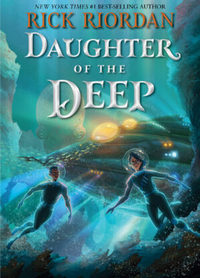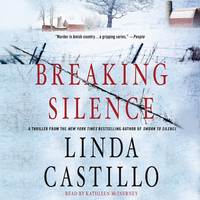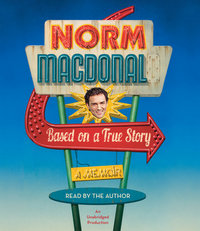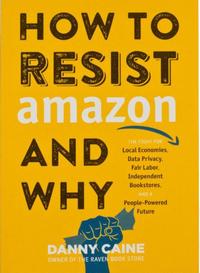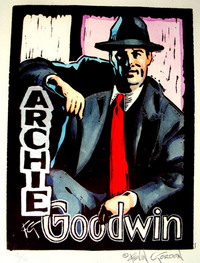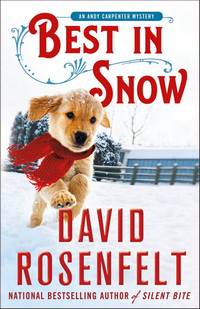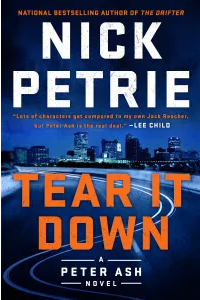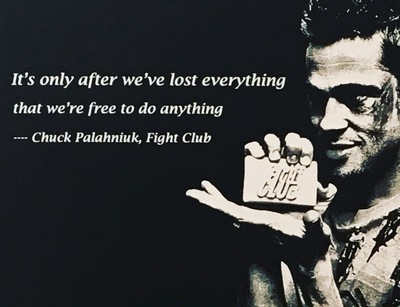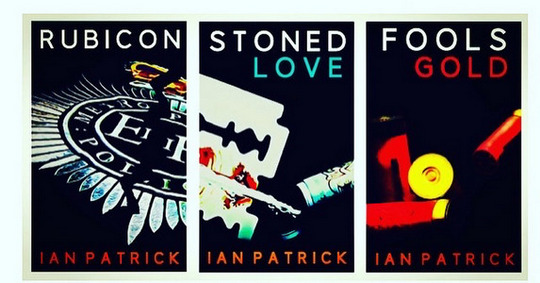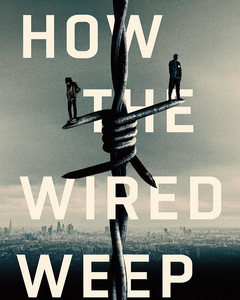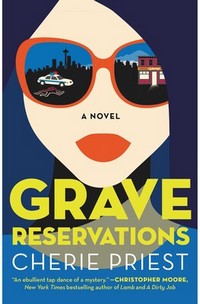 |
Grave Reservationsby Cherie Priest Hardcover, 289 pg. Read: December 10-13 |

“I’m not looking for a séance, Ms. Foley. I’m just telling you that I know there’s more to the world than what we can always see right in front of us. And I believe you when you tell me that you had a premonition, or a bad feeling, or a bad certainty—if that’s more like it. I believe you saved my life. Saved me a hell of a story and some smoke inhalation, that’s for damn sure. And now I want to hire you. Not to book any travel, and not to talk to my dead mother. I’ve got a case I’ve been beating my head against for a couple of years, and I’m all out of leads. I’m ready to try anything, which means I’m willing to try a psychic, Ms. Foley, I want you to help me solve a murder.”
What’s Grave Reservations About?
It’s pretty much about that quotation—Leda Foley is a travel agent* and self-described “inconsistent psychic.” Her intuition (or whatever you want to call it) leads her into changing the flight of a Seattle PD detective which prevents him from ending up in a plane that skidded off the runway during takeoff. Now he’s back in Seattle, grateful, and wants to use Leda to help him get a break on a cold case. Det. Grady isn’t that convinced this is going to work (Leda’s sure it won’t), but he doesn’t know what else to try.
* I’m as surprised as you to learn they still exist.
She agrees—not just because her agency is struggling and she needs pretty much any money she can earn, but because she wants to get on Det. Grady’s good side, because she wants his help on a cold case of her own—her fiancé was murdered and the police got nowhere with that investigation.
So, Leda, her bartender best friend, and Detective Gracy set out to see if her psychic abilities are at least a little more consistent than she thinks.
Leda’s Other Side Hustle
Leda’s had a large number of day jobs, none of which worked out for long. Her travel agency, Foley’s Far-Fetched Flights of Fancy, is an effort to make it on her own—and it’s pretty shaky. Leda also wants to strengthen and improve her psychic skills, so she gets on stage at a local bar for what she calls klairvoyant karaoke, but the bar’s owner prefers calling her a psychic psongstress.
Basically, she gets on stage, holds an object given to her by an audience member, and uses the impressions her abilities give her about the owner to sing a song that will be meaningful to the owner. In exchange, she gets free drinks. She’s gaining a little notoriety from this and the bar is having its most successful nights ever.
Tricky Tonal Balancing Act
This is not your typical murder mystery, that’s probably pretty clear. In her acknowledgments, Priest says she was aiming at “something lighter and funnier than my usual fare.” She hit what she aimed for. It’s comedic (sometimes very comedic), but not at a goofball level. It’s closer to Castle at its best. Or to stick to novel comparisons, think The Spellman Files (especially the slightly more serious last couple), Max Wirestone’s Dahlia Moss books or David Ahern’s Madam Tulip books. The latter is the best comparison (not just because Leda’s psychic abilities made me think of Derry more than a few times), but Leda’s friends remind me of Derry’s—but I threw in the others because too few people know anything about Madam Tulip.
Back to Grave Reservations—Priest walks the tightrope between too silly for a mystery and too serious for a story about a travel agent/inconsistent psychic–—which cannot be anywhere as easy as she makes it look. With all of the above comparisons, I occasionally wasn’t sure about the consistency of the tone (or the appropriateness of it when the creators weren’t on the top of their game). Priest didn’t have that problem at all. Which is a tribute to her skill.
So, what did I think about Grave Reservations?
I don’t have a lot to say here–it’s really good. Priest surrounds Leda and Det. Grady with a bunch of characters that bring the comedy on the personal side and suspects, victims, and witnesses that keep the serious side of the story working. Either set of characters make this a fun read—put them together and you have something special.
The mystery itself was pretty good—and having Leda’s abilities providing the leaps of logic that allow Grady to start looking in the right places is a great idea. Priest doesn’t have to “play fair” like most mystery novelists and she can just wave the Psychic ex Machina wand to get her out of tricky places.
Grave Reservations is a great bit of light escapist reading—and the way Priest set it up for a series suggests that we’ll be able to escape into this world for a little while longer. And we all could use something like that right now, can’t we?

This post contains an affiliate link. If you purchase from it, I will get a small commission at no additional cost to you. As always, opinions are my own.
![]()



